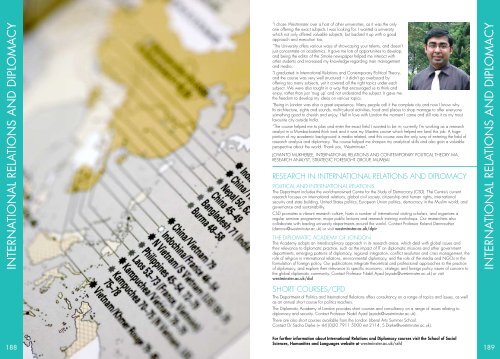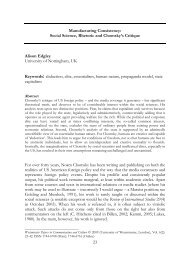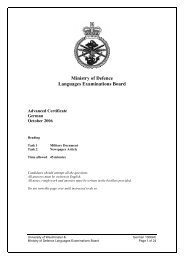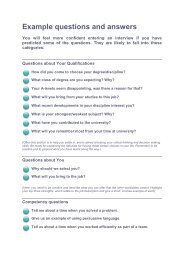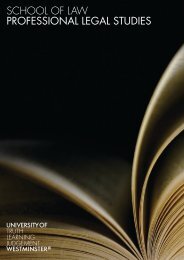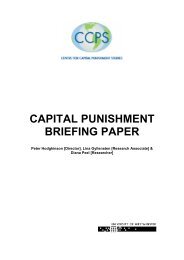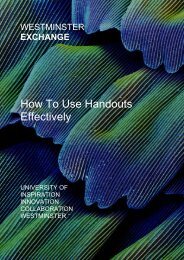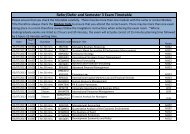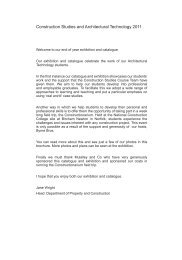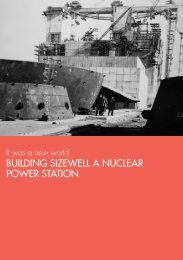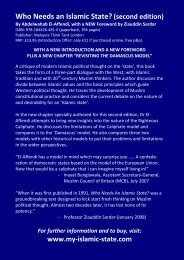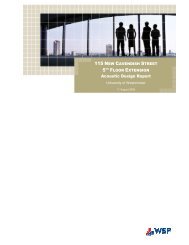political and international relations - University of Westminster
political and international relations - University of Westminster
political and international relations - University of Westminster
You also want an ePaper? Increase the reach of your titles
YUMPU automatically turns print PDFs into web optimized ePapers that Google loves.
INTERNATIONAL RELATIONS AND DIPLOMACY“I chose <strong>Westminster</strong> over a host <strong>of</strong> other universities, as it was the onlyone <strong>of</strong>fering the exact subjects I was looking for. I wanted a universitywhich not only <strong>of</strong>fered valuable subjects, but backed it up with a goodapproach <strong>and</strong> execution too.“The <strong>University</strong> <strong>of</strong>fers various ways <strong>of</strong> showcasing your talents, <strong>and</strong> doesn’tjust concentrate on academics. It gave me lots <strong>of</strong> opportunities to develop,<strong>and</strong> being the editor <strong>of</strong> the Smoke newspaper helped me interact withother students <strong>and</strong> increased my knowledge regarding man management<strong>and</strong> media.“I graduated in International Relations <strong>and</strong> Contemporary Political Theory,<strong>and</strong> the course was very well structured – it didn’t go overboard by<strong>of</strong>fering too many subjects, yet it covered all the right topics under eachsubject. We were also taught in a way that encouraged us to think <strong>and</strong>enjoy, rather than just ‘mug up’ <strong>and</strong> not underst<strong>and</strong> the subject. It gave methe freedom to develop my ideas on various topics.“Being in London was also a great experience. Many people call it the complete city <strong>and</strong> now I know why.Its architecture, sights <strong>and</strong> sounds, multi-cultural activities, food <strong>and</strong> places to shop manage to <strong>of</strong>fer everyonesomething good to cherish <strong>and</strong> enjoy. I fell in love with London the moment I came <strong>and</strong> still rate it as my mostfavourite city outside India.“The course helped me to plan <strong>and</strong> enter the exact field I wanted to be in; currently I’m working as a researchanalyst in a Mumbai-based think tank <strong>and</strong> it was my Masters course which helped me l<strong>and</strong> this job. A hugeportion <strong>of</strong> my academic background is media related, <strong>and</strong> this course was the only way <strong>of</strong> entering the field <strong>of</strong>research analysis <strong>and</strong> diplomacy. The course helped me sharpen my analytical skills <strong>and</strong> also gain a valuableperspective about the world. Thank you, <strong>Westminster</strong>.”JOYANTO MUKHERJEE, INTERNATIONAL RELATIONS AND CONTEMPORARY POLITICAL THEORY MA,RESEARCH ANALYST, STRATEGIC FORESIGHT GROUP, MUMBAIResearch in International Relations <strong>and</strong> DiplomacyPolitical <strong>and</strong> International RelationsThe Department includes the world-renowned Centre for the Study <strong>of</strong> Democracy (CSD). The Centre’s currentresearch focuses on <strong>international</strong> <strong>relations</strong>, global civil society, citizenship <strong>and</strong> human rights, <strong>international</strong>security <strong>and</strong> state building, United States politics, European Union politics, democracy in the Muslim world, <strong>and</strong>governance <strong>and</strong> sustainability.CSD promotes a vibrant research culture, hosts a number <strong>of</strong> <strong>international</strong> visiting scholars, <strong>and</strong> organises aregular seminar programme, major public lectures <strong>and</strong> research training workshops. Our researchers alsocollaborate with leading university departments around the world. Contact Pr<strong>of</strong>essor Rol<strong>and</strong> Dannreuther(dannrer@westminster.ac.uk) or visit westminster.ac.uk/dpirThe Diplomatic Academy <strong>of</strong> LondonThe Academy adopts an interdisciplinary approach in its research areas, which deal with global issues <strong>and</strong>their relevance to diplomatic practice, such as the impact <strong>of</strong> IT on diplomatic missions <strong>and</strong> other governmentdepartments, emerging patterns <strong>of</strong> diplomacy, regional integration, conflict resolution <strong>and</strong> crisis management, therole <strong>of</strong> religion in <strong>international</strong> <strong>relations</strong>, environmental diplomacy, <strong>and</strong> the role <strong>of</strong> the media <strong>and</strong> NGOs in theformulation <strong>of</strong> foreign policy. Our publications integrate theoretical <strong>and</strong> pr<strong>of</strong>essional approaches to the practice<strong>of</strong> diplomacy, <strong>and</strong> explore their relevance to specific economic, strategic <strong>and</strong> foreign policy issues <strong>of</strong> concern tothe global diplomatic community. Contact Pr<strong>of</strong>essor Nabil Ayad (ayadn@westminster.ac.uk) or visitwestminster.ac.uk/dalShort courses/CPDThe Department <strong>of</strong> Politics <strong>and</strong> International Relations <strong>of</strong>fers consultancy on a range <strong>of</strong> topics <strong>and</strong> issues, as wellas an annual short course for politics teachers.The Diplomatic Academy <strong>of</strong> London provides short courses <strong>and</strong> consultancy on a range <strong>of</strong> issues relating todiplomacy <strong>and</strong> security. Contact Pr<strong>of</strong>essor Nabil Ayad (ayadn@westminster.ac.uk).There are also short courses available from the London Liberal Arts Summer School.Contact Dr Sacha Darke (+ 44 (0)20 7911 5000 ext 2114, S.Darke@westminster.ac.uk).INTERNATIONAL RELATIONS AND DIPLOMACY188For further information about International Relations <strong>and</strong> Diplomacy courses visit the School <strong>of</strong> SocialSciences, Humanities <strong>and</strong> Languages website at westminster.ac.uk/sshl189
INTERNATIONAL RELATIONS AND DIPLOMACYDiplomatic Studies MAThis course, <strong>of</strong>fered by the Diplomatic Academy <strong>of</strong> London (DAL),develops your conceptual underst<strong>and</strong>ing <strong>of</strong> the practices <strong>and</strong>procedures <strong>of</strong> modern diplomacy, <strong>and</strong> enhances your ability towork effectively within the diplomatic community. It is designed fordiplomats, <strong>of</strong>ficials <strong>of</strong> various overseas ministerial departments,members <strong>of</strong> <strong>international</strong> <strong>and</strong> regional organisations, <strong>and</strong> staff <strong>of</strong>non-governmental organisations <strong>and</strong> multinational corporations,as well as those who wish to pursue a diplomatic career in thefuture, or work for other government departments or multinationalcorporations. Courses <strong>of</strong>fered by the DAL are highly valued for theirrelevance <strong>and</strong> focus on career development.Course contentCore modules: Diplomacy: Practice, Procedures <strong>and</strong> Dynamics• Dissertation • International Security StudiesOption modules include: Diplomacy in Islam • European UnionStudies • Foreign Policy Analysis • Information <strong>and</strong> Media Studies• Information Technology in the Information Society • Intelligence <strong>and</strong>National Security Studies • Intercultural Communication • InternationalLaw <strong>and</strong> Diplomacy • International Protocol <strong>and</strong> Etiquette (subject toapproval) • International Trade <strong>and</strong> Finance • Language et PratiquesDiplomatiques (Diplomatic Discourse, in French) • Political Economy<strong>of</strong> Globalisation • Public Diplomacy (subject to approval)Related coursesInternational Liaison <strong>and</strong> Communication MA • Interpreting,Translation <strong>and</strong> Diplomacy MA • Modern Arabic <strong>and</strong> InternationalCommunication MA • Modern Islamic Studies MALength <strong>of</strong> courseOne-year, full-time ortwo-year, part-time (Januarystart available)LocationCentral London (Regent)Fee b<strong>and</strong>Fee b<strong>and</strong> 3, see p34Associated careersIn a rapidly changing <strong>international</strong>environment there is an increasingdem<strong>and</strong> for graduates <strong>and</strong>pr<strong>of</strong>essionals who have the relevantknowledge <strong>and</strong> skills in diplomacy,the media <strong>and</strong> <strong>international</strong>security. The Diplomatic Studiescourse has attracted members<strong>of</strong> the London diplomatic corps,staff <strong>of</strong> overseas ministries forforeign affairs, <strong>international</strong> <strong>and</strong>regional organisations, nongovernmentalorganisations <strong>and</strong>multinational corporations, as wellas graduates who wish to pursuea diplomatic career, or work forother government departments ormultinational corporations.Entry requirementsNormally, you must have eithera first degree from a recognisedUK or overseas institution, apostgraduate degree, or apr<strong>of</strong>essional qualification ina relevant discipline, such aspolitics, economics, law orlanguages. Alternatively, you mayhave knowledge <strong>and</strong> skills at auniversity degree st<strong>and</strong>ard, normallythrough five years’ relevant workexperience. If your first languageis not English, you will need anIELTS score <strong>of</strong> 6.5 or equivalent,<strong>and</strong> you may need to attend aninterview <strong>and</strong> pass a language test.The <strong>University</strong> <strong>of</strong>fers pre-sessionalsummer courses if you need toimprove your English.International Liaison <strong>and</strong> Communication MAIt has always been understood that operating effectively in an<strong>international</strong> environment requires good communicative ability.With the growth in global interaction, it is increasingly apparent thateffective mediation <strong>and</strong> liaison skills require a combination <strong>of</strong> widerangingbackground knowledge, cultural sensitivity, <strong>and</strong> ability intwo or more languages.This course, which is <strong>of</strong>fered by the Diplomatic Academy <strong>of</strong> London(DAL), is designed for pr<strong>of</strong>essionals working with languages inareas such as military liaison, diplomacy, security organisations<strong>and</strong> intergovernmental institutions, <strong>and</strong> can be applicable tospecific interest groups such as defence <strong>and</strong> military attaches,peacekeeping <strong>of</strong>ficers, journalists, foreign correspondents,personnel from <strong>international</strong> agencies, <strong>and</strong> graduates aspiringto a career in <strong>international</strong> liaison <strong>and</strong> communication.Course contentBy the end <strong>of</strong> the course you will be able to use the knowledgegained through a detailed study <strong>of</strong> diplomatic, intelligence <strong>and</strong> policyquestions, <strong>and</strong> combine this with a high level <strong>of</strong> linguistic competence.This will enhance your ability as a presenter <strong>of</strong> information <strong>and</strong> as amediator between communities. The course is designed to help youdevelop your pr<strong>of</strong>essional specialism <strong>and</strong> enhance your skills withinan appropriate conceptual framework.Core modules: Dissertation • Information <strong>and</strong> Media Studies• Intelligence <strong>and</strong> National Security Studies • InterculturalCommunication • Research Project – Bilingual PresentationOption modules: Communication Strategies • Defence Diplomacy(subject to approval) • Diplomacy in Islam • Discourse, Content <strong>and</strong>Information Retrieval • European Union Studies • Foreign PolicyAnalysis • Information Assessment <strong>and</strong> Evaluation • InformationTechnology in the Information Society • International Liaison• Language et Pratiques Diplomatiques (Diplomatic Discourse, inFrench) • Leadership <strong>and</strong> Management in a Military Context• Military Institutional Studies • Text Drafting SkillsRelated coursesBilingual Translation MA • Conference InterpretingTechniques MA • Diplomatic Studies MA • Modern Arabic<strong>and</strong> International Communication MA • Translation, Interpreting<strong>and</strong> Diplomacy MALength <strong>of</strong> courseOne-year, full-time ortwo-year, part-time(January start available)LocationCentral London (Regent)Fee b<strong>and</strong>Fee b<strong>and</strong> 1, see p34Associated careersSuccessful graduates have operatedas liaison pr<strong>of</strong>essionals in the fields<strong>of</strong> business, diplomacy, the media,national <strong>and</strong> <strong>international</strong> security,peacekeeping, <strong>and</strong> other arenaswhere joint <strong>international</strong> operationstake place.Entry requirementsYou will normally be a graduate orhave equivalent pr<strong>of</strong>essional status.You must <strong>of</strong>fer two languages,including English; you must bean habitual user or fluent in onelanguage, <strong>and</strong> be capable <strong>of</strong>listening, speaking <strong>and</strong> readingin the other language to at leastCouncil <strong>of</strong> Europe Level B2/C1.You must also demonstrate validreasons for wishing to study thecourse, underst<strong>and</strong>ing <strong>of</strong> the nature<strong>and</strong> dem<strong>and</strong>s <strong>of</strong> the course <strong>and</strong>the conceptual <strong>and</strong> intellectualfoundations needed to study atpostgraduate level. Where Englishis not your first language, you willneed either an IELTS score <strong>of</strong> 6.5,a TOEFL score <strong>of</strong> 600 (paper)/92(internet), a Cambridge Certificate<strong>of</strong> Pr<strong>of</strong>iciency Grade B, or Council<strong>of</strong> Europe B2/C1. You may beinvited to an interview.INTERNATIONAL RELATIONS AND DIPLOMACY190191
INTERNATIONAL RELATIONS AND DIPLOMACYInternational Relations MAThe <strong>international</strong>ly recognised Department <strong>of</strong> Politics <strong>and</strong>International Relations hosts this course, <strong>of</strong>fering an innovative,disciplined <strong>and</strong> intellectually challenging theoretical <strong>and</strong> empiricalframework for the study <strong>of</strong> issues <strong>and</strong> perspectives within the<strong>international</strong> <strong>relations</strong> discipline. You will consider various aspects<strong>of</strong> <strong>international</strong> order <strong>and</strong> politics, including the dynamics <strong>of</strong><strong>international</strong> social <strong>and</strong> <strong>political</strong> power <strong>relations</strong>hips <strong>and</strong> conflicts,<strong>and</strong> state building. These topics are studied comparatively in relationto governmental, <strong>political</strong> <strong>and</strong> social processes, <strong>and</strong> in the contexts <strong>of</strong>various historical continuities, discontinuities <strong>and</strong> contrasts.Course contentCore modules: Dissertation <strong>and</strong> Research Methods • InternationalRelations Theory 1: Theoretical Perspectives • InternationalRelations Theory 2: Beyond International Relations? • InternationalState-Building: Exporting Democracy?The Dissertation module must be taken either following thecompletion <strong>of</strong> all other modules, or concurrently with modules inyour second semester.In addition to the core modules, you must also choose three optionmodules* from the following: Controversies in United States ForeignPolicymaking <strong>and</strong> Processes • Democracy <strong>and</strong> Islam • Environmental<strong>and</strong> Urban Governance: International Perspectives • EuropeanImmigration Policy in International Perspective • InternationalHumanitarian Law • Introduction to Contemporary Chinese Societies<strong>and</strong> Cultures • Latin America <strong>and</strong> Globalisation • Modernity,Postmodernity <strong>and</strong> the Islamic Perspective • Perspectives on Post-ColdWar Chinese Foreign Policy • Politics, Public Life <strong>and</strong> the Media• Either Postcolonial International Relations? Theories <strong>and</strong> Conceptsor Global Change: Toward a New Non-Western Order?• Either The European Union as an International Actor or TheGovernance <strong>of</strong> the European Union• Either The State, Politics <strong>and</strong> Violence or The Human Sciences:Perspectives <strong>and</strong> Methods• Either Theories <strong>of</strong> International Security or ContemporaryControversies in International Security: Intervention, Terrorism <strong>and</strong>Self-DefenceThe Dissertation module must be taken either following thecompletion <strong>of</strong> all other modules, or concurrently with modules inyour second semester.*One <strong>of</strong> your options may be an approved free choice module hostedby another Masters course.Related coursesGlobalisation, Development <strong>and</strong> Transition MA • InternationalRelations <strong>and</strong> Contemporary Political Theory MA • InternationalRelations <strong>and</strong> European Politics MA • International Relations <strong>and</strong>Global Change MA • International Relations <strong>and</strong> Security MALength <strong>of</strong> courseOne-year, full-time ortwo-year, part-timeLocationCentral London (Regent)Fee b<strong>and</strong>Fee b<strong>and</strong> 2, see p34Associated careersThis course will provide you withnumerous key skills <strong>and</strong> knowledgethat will prepare you for your futurecareer in a variety <strong>of</strong> different fields.Our graduates go on to careerswithin various <strong>international</strong> <strong>and</strong>national government departments,<strong>international</strong> organisations<strong>and</strong> business, <strong>and</strong> the media.Many have also gone on tostudy for doctorates within theDepartment or at other universitiesin different parts <strong>of</strong> the world.Entry requirementsYou will require a First Class orUpper Second Class Honoursdegree or equivalent; equivalentqualifications from overseas arewelcome. If you hold or areexpecting to gain a good firstdegree in an unrelated subject,you may need to complete the<strong>University</strong>’s Summer School modulein <strong>international</strong> <strong>relations</strong>, or anequivalent approved by the courseadmissions tutor. Your applicationmust be supported by a referencewritten on institutional notepaperby an academic familiar with yourabilities. Applications from maturec<strong>and</strong>idates are welcomed. If yourfirst language is not English, youwill need an IELTS score <strong>of</strong> 6.5 orequivalent. The <strong>University</strong> <strong>of</strong>ferspre-sessional summer programmesif you need to improve your Englishbefore starting your course.International Relations <strong>and</strong> Contemporary Political Theory MAThis course <strong>of</strong>fers an innovative, intellectually challenging <strong>and</strong>integrated approach to <strong>international</strong> <strong>relations</strong> <strong>and</strong> issues <strong>and</strong>perspectives on contemporary <strong>political</strong> <strong>and</strong> social theory. It ishosted by the <strong>international</strong>ly recognised Department <strong>of</strong> Politics <strong>and</strong>International Relations.You will consider various aspects <strong>of</strong> <strong>international</strong> order <strong>and</strong> politics,including the dynamics <strong>of</strong> <strong>international</strong> social <strong>and</strong> <strong>political</strong> power<strong>relations</strong>hips as well as the role <strong>of</strong> violence, peace <strong>and</strong> war in therise <strong>of</strong> the modern state, <strong>and</strong> competing perspectives on the humansciences. You will study these topics comparatively in relation togovernmental, <strong>political</strong> <strong>and</strong> social processes, <strong>and</strong> in the contexts <strong>of</strong>various historical continuities, discontinuities <strong>and</strong> contrasts.Course contentCore modules: Dissertation <strong>and</strong> Research Methods • InternationalRelations Theory 1: Theoretical Perspectives • The Human Sciences:Perspectives <strong>and</strong> Methods • The State, Politics <strong>and</strong> ViolenceIn addition to the core modules, you must also choose three optionmodules* from the following: Controversies in United StatesForeign Policymaking <strong>and</strong> Processes • Democracy <strong>and</strong> Islam• Environmental <strong>and</strong> Urban Governance: International Perspectives• European Immigration Policy in International Perspective• International Humanitarian Law• Either International Relations 2: Beyond International Relations? orInternational State-Building: Exporting Democracy? • Introduction toContemporary Chinese Societies <strong>and</strong> Cultures • Latin America <strong>and</strong>Globalisation • Modernity, Postmodernity <strong>and</strong> the Islamic Perspective• Perspectives on Post-Cold War Chinese Foreign Policy • Politics,Public Life <strong>and</strong> the Media• Either Postcolonial International Relations? Theories <strong>and</strong> Concepts orGlobal Change: Toward a New Non-Western Order?• Either The European Union as an International Actor or TheGovernance <strong>of</strong> the European Union• Either Theories <strong>of</strong> International Security or ContemporaryControversies in International Security: Intervention, Terrorism <strong>and</strong>Self-DefenceThe Dissertation module must be taken either following thecompletion <strong>of</strong> all other modules, or concurrently with modules inyour second semester.*One <strong>of</strong> your options may be an approved free choice module hostedby another Masters course.Related coursesGlobalisation, Development <strong>and</strong> Transition MA • InternationalRelations MA • International Relations <strong>and</strong> European Politics MA• International Relations <strong>and</strong> Global Change MA • InternationalRelations <strong>and</strong> Security MALength <strong>of</strong> courseOne-year, full-time ortwo-year, part-time (Januarystart available)LocationCentral London (Regent)Fee b<strong>and</strong>Fee b<strong>and</strong> 2, see p34Associated careersThis course will provide you withnumerous key skills <strong>and</strong> knowledgethat will prepare you for your futurecareer in a variety <strong>of</strong> differentfields. Our graduates hold postswithin various <strong>international</strong> <strong>and</strong>national government departments<strong>and</strong> organisations. Many have alsogone on to study for doctorateswithin the Department <strong>and</strong> at otheruniversities around the world.Entry requirementsYou will require a First Class orUpper Second Class Honoursdegree or equivalent; equivalentqualifications from overseas arewelcome. If you hold or areexpecting to gain a good firstdegree in an unrelated subject,you may need to complete the<strong>University</strong>’s Summer School modulein <strong>international</strong> <strong>relations</strong>, or anequivalent approved by the courseadmissions tutor. Your applicationmust be supported by a referencewritten on institutional notepaperby an academic familiar with yourabilities. Applications from maturec<strong>and</strong>idates are welcomed. If yourfirst language is not English, youwill need an IELTS score <strong>of</strong> 6.5 orequivalent. The <strong>University</strong> <strong>of</strong>ferspre-sessional summer programmesif you need to improve your Englishbefore starting your course.INTERNATIONAL RELATIONS AND DIPLOMACY192193
INTERNATIONAL RELATIONS AND DIPLOMACYInternational Relations <strong>and</strong> European Politics MAThe <strong>international</strong>ly recognised Department <strong>of</strong> Politics <strong>and</strong> InternationalRelations hosts this course, <strong>of</strong>fering an innovative, interdisciplinary<strong>and</strong> intellectually challenging theoretical <strong>and</strong> empirical framework forthe study <strong>of</strong> the European Union (EU) in a global context. Europeanintegration plays a central role in contemporary <strong>international</strong><strong>relations</strong>. At the start <strong>of</strong> the 21st century, the EU st<strong>and</strong>s as one <strong>of</strong>the world’s leading economic <strong>and</strong> <strong>political</strong> powers. Its <strong>international</strong>activities span <strong>international</strong> trade, diplomacy, security, conflictprevention, <strong>and</strong> overseas aid <strong>and</strong> development.This course approaches the study <strong>of</strong> European integration <strong>and</strong> EUpolitics through classic <strong>and</strong> contemporary literatures in the fields<strong>of</strong> <strong>international</strong> <strong>relations</strong> <strong>and</strong> comparative politics. It combinesa rigorous theoretical grounding with pr<strong>of</strong>essionally relevantknowledge <strong>and</strong> debate on leading issues.Course contentCore modules: Dissertation <strong>and</strong> Research Methods • Governance<strong>of</strong> the European Union • International Relations 1: Theories <strong>and</strong>Perspectives • The European Union as an International ActorIn addition to the core modules, you must also choose three optionmodules* from the following: Controversies in United States ForeignPolicymaking <strong>and</strong> Processes • Democracy <strong>and</strong> Islam • Environmental<strong>and</strong> Urban Governance: International Perspectives • EuropeanImmigration Policy in International Perspective • InternationalHumanitarian Law• Either International Relations 2: Beyond International Relations? orInternational State-Building: Exporting Democracy? • Introduction toContemporary Chinese Societies <strong>and</strong> Cultures • Latin America <strong>and</strong>Globalisation • Modernity, Postmodernity <strong>and</strong> the Islamic Perspective• Perspectives on Post-Cold War Chinese Foreign Policy • Politics,Public Life <strong>and</strong> the Media• Either Postcolonial International Relations? Theories <strong>and</strong> Concepts orGlobal Change: Toward a New Non-Western Order?• Either The State, Politics <strong>and</strong> Violence or The Human Sciences:Perspectives <strong>and</strong> Methods• Either Theories <strong>of</strong> International Security or ContemporaryControversies in International Security: Intervention, Terrorism <strong>and</strong>Self-DefenceThe Dissertation module must be taken either following thecompletion <strong>of</strong> all other modules, or concurrently with modules inyour second semester.*One <strong>of</strong> your options may be an approved free choice module hostedby another Masters course.Related coursesGlobalisation, Development <strong>and</strong> Transition MA • InternationalRelations MA • International Relations <strong>and</strong> Contemporary PoliticalTheory MA • International Relations <strong>and</strong> Global Change MA• International Relations <strong>and</strong> Security MALength <strong>of</strong> courseOne-year, full-time ortwo-year, part-timeLocationCentral London (Regent)Fee b<strong>and</strong>Fee b<strong>and</strong> 2, see p34Associated careersThis course will provide you withnumerous key skills <strong>and</strong> knowledgethat will prepare you for your futurecareer in a variety <strong>of</strong> differentfields. Our graduates hold postswithin various <strong>international</strong> <strong>and</strong>national government departments<strong>and</strong> organisations. Manyhave also gone on to study fordoctorates at <strong>Westminster</strong> <strong>and</strong>other universities around the world.Entry requirementsYou will require a First Class orUpper Second Class Honoursdegree or equivalent; equivalentqualifications from overseas arewelcome. If you hold or areexpecting to gain a good firstdegree in an unrelated subject,you may need to complete the<strong>University</strong>’s Summer School modulein <strong>international</strong> <strong>relations</strong>, or anequivalent approved by the courseadmissions tutor. Your applicationmust be supported by a referencewritten on institutional notepaperby an academic familiar with yourabilities. Applications from maturec<strong>and</strong>idates are welcomed. If yourfirst language is not English, youwill need an IELTS score <strong>of</strong> 6.5 orequivalent. The <strong>University</strong> <strong>of</strong>ferspre-sessional summer programmesif you need to improve your Englishbefore starting your course.International Relations <strong>and</strong> Global Change MAThis course examines the changes within <strong>international</strong> <strong>relations</strong>brought on by the rise <strong>of</strong> non-Western states, especially China <strong>and</strong>India. It will engage with conventional <strong>and</strong> postcolonial theoriesthat enable a critical analysis <strong>of</strong> global change brought on by thepredicted rise <strong>of</strong> the non-West, <strong>and</strong> domestic <strong>and</strong> <strong>international</strong> politics<strong>of</strong> India <strong>and</strong> China, in comparative perspective.The course considers the extent to which the expected rise <strong>of</strong> China<strong>and</strong> India poses fundamental challenges to the West-dominated<strong>international</strong> order. The course also examines how multiculturalism,immigration, religion, race, gender, ethnicity, culture <strong>and</strong> otheridentity-related issues impact upon <strong>international</strong> <strong>relations</strong> <strong>and</strong> areaffected by them.Course contentCore modules: Dissertation <strong>and</strong> Research Methods • Global Change:Toward a New Non-Western Order? • International Relations 1:Theories <strong>and</strong> Perspectives • Postcolonial International Relations?Theories <strong>and</strong> ConceptsIn addition to the core modules, you must also chose three optionmodules* from the following: Controversies in United States ForeignPolicymaking <strong>and</strong> Processes • Democracy <strong>and</strong> Islam • Environmental<strong>and</strong> Urban Governance: International Perspectives • EuropeanImmigration Policy in International Perspective • InternationalHumanitarian Law• Either International Relations 2: Beyond International Relations? orInternational State-Building: Exporting Democracy? • Introduction toContemporary Chinese Societies <strong>and</strong> Cultures • Latin America <strong>and</strong>Globalisation • Modernity, Postmodernity <strong>and</strong> the Islamic Perspective• Perspectives on Post-Cold War Chinese Foreign Policy • Politics,Public Life <strong>and</strong> the Media• Either The European Union as an International Actor or TheGovernance <strong>of</strong> the European Union• Either Theories <strong>of</strong> International Security or ContemporaryControversies in International Security: Intervention, Terrorism <strong>and</strong>Self-DefenceThe Dissertation module must be taken either following thecompletion <strong>of</strong> all other modules, or concurrently with modules inyour second semester.* One <strong>of</strong> your options may be an approved free choice modulehosted by another Masters course.Related coursesGlobalisation, Development <strong>and</strong> Transition MA • InternationalRelations MA • International Relations <strong>and</strong> Contemporary PoliticalTheory MA • International Relations <strong>and</strong> European Politics MA• International Relations <strong>and</strong> Security MALength <strong>of</strong> courseOne-year, full-time ortwo-year, part-time (Januarystart available)LocationCentral London (Regent)Fee b<strong>and</strong>Fee b<strong>and</strong> 2, see p34Associated careersThis course will provide you withnumerous key skills <strong>and</strong> knowledgethat will prepare you for your futurecareer in a variety <strong>of</strong> differentfields. Our graduates hold postswithin various <strong>international</strong> <strong>and</strong>national government departments<strong>and</strong> organisations. Manyhave also gone on to study fordoctorates at <strong>Westminster</strong> <strong>and</strong>other universities around the world.Entry requirementsYou will require a First Class orUpper Second Class Honoursdegree or equivalent; equivalentqualifications from overseas arewelcome. If you hold or areexpecting to gain a good firstdegree in an unrelated subject,you may need to complete the<strong>University</strong>’s Summer School modulein <strong>international</strong> <strong>relations</strong>, or anequivalent approved by the courseadmissions tutor. Your applicationmust be supported by a referencewritten on institutional notepaperby an academic familiar with yourabilities. Applications from maturec<strong>and</strong>idates are welcomed. If yourfirst language is not English, youwill need an IELTS score <strong>of</strong> 6.5 orequivalent. The <strong>University</strong> <strong>of</strong>ferspre-sessional summer programmesif you need to improve your Englishbefore starting your course.INTERNATIONAL RELATIONS AND DIPLOMACY194195
INTERNATIONAL RELATIONS AND DIPLOMACYInternational Relations <strong>and</strong> Security MAThe question <strong>of</strong> security now dominates contemporary <strong>international</strong>politics. Issues such as the ‘War on Terror’, pre-emptive self-defence<strong>and</strong> humanitarian intervention constitute seminal <strong>international</strong>concerns that have implications for all states <strong>and</strong> all peoples. Thiscourse provides you with a detailed underst<strong>and</strong>ing <strong>of</strong> the nature <strong>of</strong>the contemporary security agenda, its origins, theoretical foundations<strong>and</strong> future trajectory.It focuses on theories <strong>of</strong> <strong>international</strong> security <strong>and</strong> those key securityissues that have dominated security discourse in the post-Cold Warera. The course also seeks to develop your analytical skills in order t<strong>of</strong>acilitate underst<strong>and</strong>ing <strong>of</strong> the seminal contemporary security issuesin a broader theoretical <strong>and</strong> historical framework.Course contentCore modules: Contemporary Controversies in International Security:Intervention, Terrorism <strong>and</strong> Self-Defence • Dissertation <strong>and</strong> ResearchMethods • International Relations 1: Theories <strong>and</strong> Perspectives• Theories <strong>of</strong> International SecurityIn addition to the core modules, you must also choose three optionmodules* from the following: Controversies in United States ForeignPolicymaking <strong>and</strong> Processes • Democracy <strong>and</strong> Islam • Environmental<strong>and</strong> Urban Governance: International Perspectives • EuropeanImmigration Policy in International Perspective • InternationalHumanitarian Law• Either International Relations 2: Beyond International Relations? orInternational State-Building: Exporting Democracy? • Introduction toContemporary Chinese Societies <strong>and</strong> Cultures • Latin America <strong>and</strong>Globalisation • Modernity, Postmodernity <strong>and</strong> the Islamic Perspective• Perspectives on Post-Cold War Chinese Foreign Policy • Politics,Public Life <strong>and</strong> the Media• Either Postcolonial International Relations? Theories <strong>and</strong> Concepts orGlobal Change: Toward a New Non-Western Order?• Either The European Union as an International Actor or TheGovernance <strong>of</strong> the European UnionThe Dissertation module must be taken either following thecompletion <strong>of</strong> all other modules, or concurrently with modules inyour second semester.* One <strong>of</strong> your options may be an approved free choice modulehosted by another Masters course.Related coursesGlobalisation, Development <strong>and</strong> Transition MA • InternationalRelations MA • International Relations <strong>and</strong> Contemporary PoliticalTheory MA • International Relations <strong>and</strong> European Politics MA• International Relations <strong>and</strong> Global Change MALength <strong>of</strong> courseOne-year, full-time ortwo-year, part-time (Januarystart available)LocationCentral London (Regent)Fee b<strong>and</strong>Fee b<strong>and</strong> 2, see p34Associated careersThis course will provide you withnumerous key skills <strong>and</strong> knowledgethat will prepare you for your futurecareer in a variety <strong>of</strong> differentfields. Our graduates hold postswithin various <strong>international</strong> <strong>and</strong>national government departments<strong>and</strong> organisations. Many have alsogone on to study for doctorates at<strong>Westminster</strong> <strong>and</strong> other universitiesaround the world.Entry requirementsYou will require a First Class orUpper Second Class Honoursdegree or equivalent; equivalentqualifications from overseas arewelcome. If you hold or areexpecting to gain a good firstdegree in an unrelated subject,you may need to complete the<strong>University</strong>’s Summer School modulein <strong>international</strong> <strong>relations</strong>, or anequivalent approved by the courseadmissions tutor. Your applicationmust be supported by a referencewritten on institutional notepaperby an academic familiar with yourabilities. Applications from maturec<strong>and</strong>idates are welcomed. If yourfirst language is not English, youwill need an IELTS score <strong>of</strong> 6.5 orequivalent. The <strong>University</strong> <strong>of</strong>ferspre-sessional summer programmesif you need to improve your Englishbefore starting your course.Interpreting, Translation <strong>and</strong> Diplomacy MAThis course focuses on providing you with highly pr<strong>of</strong>essionaltraining aimed at the translation <strong>and</strong> interpreting markets, <strong>and</strong> theopportunity to build on your existing language skills to develop acareer in those sectors. It is suitable whether English is your firstlanguage or not, <strong>and</strong> involves translation with one main language(Chinese, French, Italian, Polish <strong>and</strong> Spanish) <strong>and</strong> English, consecutive<strong>and</strong> liaison interpreting, diplomacy, <strong>and</strong> the MA thesis or dissertation.The course resources include an extensive collection <strong>of</strong> volumes <strong>and</strong>electronic materials in our library, <strong>and</strong> computer labs equippedwith translation memory <strong>and</strong> machine translation s<strong>of</strong>tware. Theteaching staff, including full-time <strong>and</strong> part-time visiting lecturers, areexperts in translation, interpreting <strong>and</strong> diplomacy. You will also beallocated a personal tutor <strong>and</strong> provided with academic guidance bythe course team.Course contentThe emphasis is on practical training in translation <strong>and</strong> interpreting,to develop your skills to a high level <strong>and</strong> learn about the pr<strong>of</strong>essionalenvironment. You will also learn about diplomacy <strong>and</strong> the diplomaticenvironment, <strong>and</strong> carry out research in this area. Your studying issupported by both the Centre for Interpreting <strong>and</strong> Translation <strong>and</strong> theDiplomatic Academy <strong>of</strong> London.The course modules are Translation <strong>and</strong> Interpreting, which coversa wide range <strong>of</strong> subject areas <strong>and</strong> contexts <strong>and</strong> includes bothconsecutive <strong>and</strong> liaison interpreting, <strong>and</strong> Diplomacy. The core MAcomponent can be taken as a Thesis (research on translation orinterpreting), or as a Dissertation on a topic in diplomacy.Teaching involves both class contact <strong>and</strong> independent study, <strong>and</strong>methods include lectures, workshops, seminars, group <strong>and</strong> projectwork, research, translation <strong>and</strong> interpreting assignments. Assessmentranges from translation <strong>and</strong> interpreting assignments to essays,presentations <strong>and</strong> projects.Related coursesBilingual Translation MA • Conference Interpreting MA • Technical<strong>and</strong> Specialised Translation MA • Translation <strong>and</strong> Linguistics MALength <strong>of</strong> courseOne-year, full-time or two-year,part-time, with daytime attendanceLocationCentral London (Regent)Fee b<strong>and</strong>Fee b<strong>and</strong> 3, see p34Associated careersGraduates <strong>of</strong> the Interpreting,Translation <strong>and</strong> Diplomacy MA findcareers as freelance <strong>and</strong> in-housetranslators in the corporate sectoror in national <strong>and</strong> <strong>international</strong>organisations, or as freelanceinterpreters, <strong>and</strong> in various roles inthe diplomatic environment.Entry requirementsYou should have a first degree,although mature linguists without adegree, but with sufficient workingexperience in translation <strong>and</strong>/or interpreting, are also invitedto apply. If English is not yourfirst language, you will need anIELTS score <strong>of</strong> 6.5 or equivalent.The <strong>University</strong> <strong>of</strong>fers pre-sessionalsummer programmes if you need toimprove your English before startingyour course. All applicants take anentry test consisting <strong>of</strong> written <strong>and</strong>oral components, administered bythe Admissions Office.INTERNATIONAL RELATIONS AND DIPLOMACY196197
INTERNATIONAL RELATIONS AND DIPLOMACYModern Arabic <strong>and</strong> International Communication MAArabic has always been recognised for its historical <strong>and</strong> culturalsignificance as the principal language by which Islam <strong>and</strong> Islamicculture has been transmitted. Over the last 50 years Arabic hascome to play a key role as an established medium <strong>of</strong> <strong>international</strong>communication. An <strong>of</strong>ficial language <strong>of</strong> the United Nations, its use forconveying <strong>of</strong>ficial <strong>and</strong> un<strong>of</strong>ficial messages <strong>of</strong> <strong>international</strong> importanceis increasingly <strong>of</strong> interest to a range <strong>of</strong> media, business, military,security, government <strong>and</strong> non-governmental organisations that havea need to underst<strong>and</strong> the perspective <strong>of</strong> <strong>and</strong> communicate with anArabic-speaking audience.The aims <strong>of</strong> the course are to develop your underst<strong>and</strong>ing <strong>of</strong> thecomplexities <strong>of</strong> communication in the contemporary Arab world,<strong>and</strong> to provide postgraduate language training that will allow youto construct <strong>and</strong> convey sophisticated messages in pr<strong>of</strong>essionallyrelevant contexts.Course contentBy the end <strong>of</strong> the course you will be able to draw on your contextualknowledge <strong>and</strong> linguistic skills to provide decision makers withauthoritative <strong>and</strong> credible interpretations <strong>of</strong> the use <strong>of</strong> modern Arabicto convey complex messages in the <strong>international</strong> arena. To enable youto do this, a range <strong>of</strong> sociolinguistic concepts, models <strong>and</strong> analyticaltechniques appropriate to the interpretation <strong>and</strong> contextualisation<strong>of</strong> <strong>of</strong>ficial <strong>and</strong> un<strong>of</strong>ficial messages disseminated in <strong>and</strong> by the Arabmedia are taught.Core modules: Bilingual Research Presentation • Critical Approachesto Arabic Communication • Critical Approaches to Arabic Language<strong>and</strong> Identity • DissertationOption modules: Advanced Arabic/English Language Skills• Diplomacy in Islam • Discourse, Content <strong>and</strong> Information Retrieval• Intercultural Communication • IT in the Information Society• Modernity, Postmodernity <strong>and</strong> the Islamic PerspectiveRelated coursesBilingual Translation MA • Interpreting, Translation <strong>and</strong>Diplomacy MA • Modern Islamic Studies MALength <strong>of</strong> courseOne-year, full-time ortwo-year, part-timeLocationCentral London (Regent)Fee b<strong>and</strong>Fee b<strong>and</strong> 1, see p34Associated careersArabists with a high level <strong>of</strong>linguistic ability <strong>and</strong> contextualknowledge <strong>of</strong> the discourses <strong>of</strong>the contemporary Arab world areincreasingly sought by a variety <strong>of</strong>organisations. They are particularlylooking for individuals who cancombine the skills <strong>and</strong> knowledge<strong>of</strong> a pr<strong>of</strong>essional communicatorwith those <strong>of</strong> a linguist who c<strong>and</strong>raw on a range <strong>of</strong> more specialisttranslation <strong>and</strong> transcription skills,<strong>and</strong> who also has the tools todecode, contextualise <strong>and</strong>interpret a range <strong>of</strong> culturallysophisticated messages <strong>and</strong> textsfor a western audience.Entry requirementsYou need to demonstrate validreasons for wishing to study thecourse, an underst<strong>and</strong>ing <strong>of</strong>the nature <strong>and</strong> dem<strong>and</strong>s <strong>of</strong> thecourse, <strong>and</strong> consideration <strong>of</strong> futurecareer intentions. You should alsobe able to engage in bilingualcommunication at postgraduatelevel, <strong>and</strong> have the conceptual <strong>and</strong>intellectual foundations neededto study at postgraduate level.Typically you will have a goodHonours degree in a relevant area,<strong>and</strong> linguistic competence in English<strong>and</strong> Arabic equivalent to post-firstdegree st<strong>and</strong>ard. If English is notyour first language, you will needan IELTS score <strong>of</strong> 6.5 or equivalent.The <strong>University</strong> <strong>of</strong>fers pre-sessionalsummer programmes if you needto improve your English beforestarting your course.Modern Islamic Studies MAThis course addresses issues relevant to the various roles whichMuslim nations <strong>and</strong> communities have been increasingly playing inthe modern world at <strong>political</strong>, economic, diplomatic, doctrinal, <strong>and</strong>other levels. In view <strong>of</strong> the pr<strong>of</strong>ile Islamic issues have been assumingin world affairs, the course (<strong>of</strong>fered by the Diplomatic Academy<strong>of</strong> London) will enable you to undertake Islamic studies in the UK,benefiting from the historical British engagement with the Arab <strong>and</strong>Muslim world as well as from London’s central location <strong>and</strong> unique<strong>and</strong> well-publicised research facilities.Course contentThe course distinguishes itself from others in the field by highlightingthese issues within a broad contemporary <strong>and</strong> dynamic framework.Its holistic <strong>and</strong> integrative approach, combining theoretical <strong>and</strong>practical methodologies, will further distinguish it from moretraditional approaches steeped in theology, history or Middle Easternstudies. With its emphasis on modern <strong>and</strong> practical realities, thiscourse challenges <strong>and</strong> engages with diplomatic issues <strong>and</strong> conflictresolution techniques.Core modules: Dissertation • Islam <strong>and</strong> International Security• Islamic Culture <strong>and</strong> Civilisation • Islamic Law <strong>and</strong> theModern WorldOption modules: Democracy <strong>and</strong> Islam • Diplomacy in Islam• Information Technology in the Information Society • InterculturalCommunication • Islam <strong>and</strong> Interfaith Dialogue • Islam <strong>and</strong> Muslimsin the Contemporary Media • Islamic Banking <strong>and</strong> Finance• Modernity, Post Modernity <strong>and</strong> the Islamic PerspectiveRelated coursesDiplomatic Studies MA • International Liaison <strong>and</strong>Communication MA • Interpreting, Translation <strong>and</strong> Diplomacy MA• Modern Arabic <strong>and</strong> International Communication MALength <strong>of</strong> courseOne-year, full-time ortwo-year, part-timeLocationCentral London (Regent)Fee b<strong>and</strong>Fee b<strong>and</strong> 1, see p34Associated careersThere is a realisation thatspecialisation in Islamic issuesgenerates interest <strong>and</strong> opportunitiesfor employment <strong>and</strong>/or furtherstudy. Areas for furtherpr<strong>of</strong>essional <strong>and</strong>/or academicadvancement include foreignaffairs, <strong>international</strong> <strong>relations</strong>,diplomacy, security, religiousbodies, community <strong>relations</strong>,interfaith organisations, nongovernmentalorganisations(NGOs), development, business,the media, <strong>and</strong> interculturalcommunication.Entry requirementsYou should hold a <strong>University</strong>degree or equivalent in a relevantdiscipline; or a postgraduatediploma from a recognisededucational institution; ora recognised pr<strong>of</strong>essionalqualification in a relevant discipline.Alternatively, you may have therelevant knowledge <strong>and</strong> skillsequivalent to first-degree level,normally by means <strong>of</strong> a fiveyearperiod <strong>of</strong> relevant workexperience. Knowledge <strong>of</strong> Arabicis desirable but not essential. Ifyour first language is not English,you will need an IELTS score 6.5or equivalent. The <strong>University</strong> <strong>of</strong>ferspre-sessional summer programmesif you need to improve your Englishbefore starting your course.INTERNATIONAL RELATIONS AND DIPLOMACY198199


